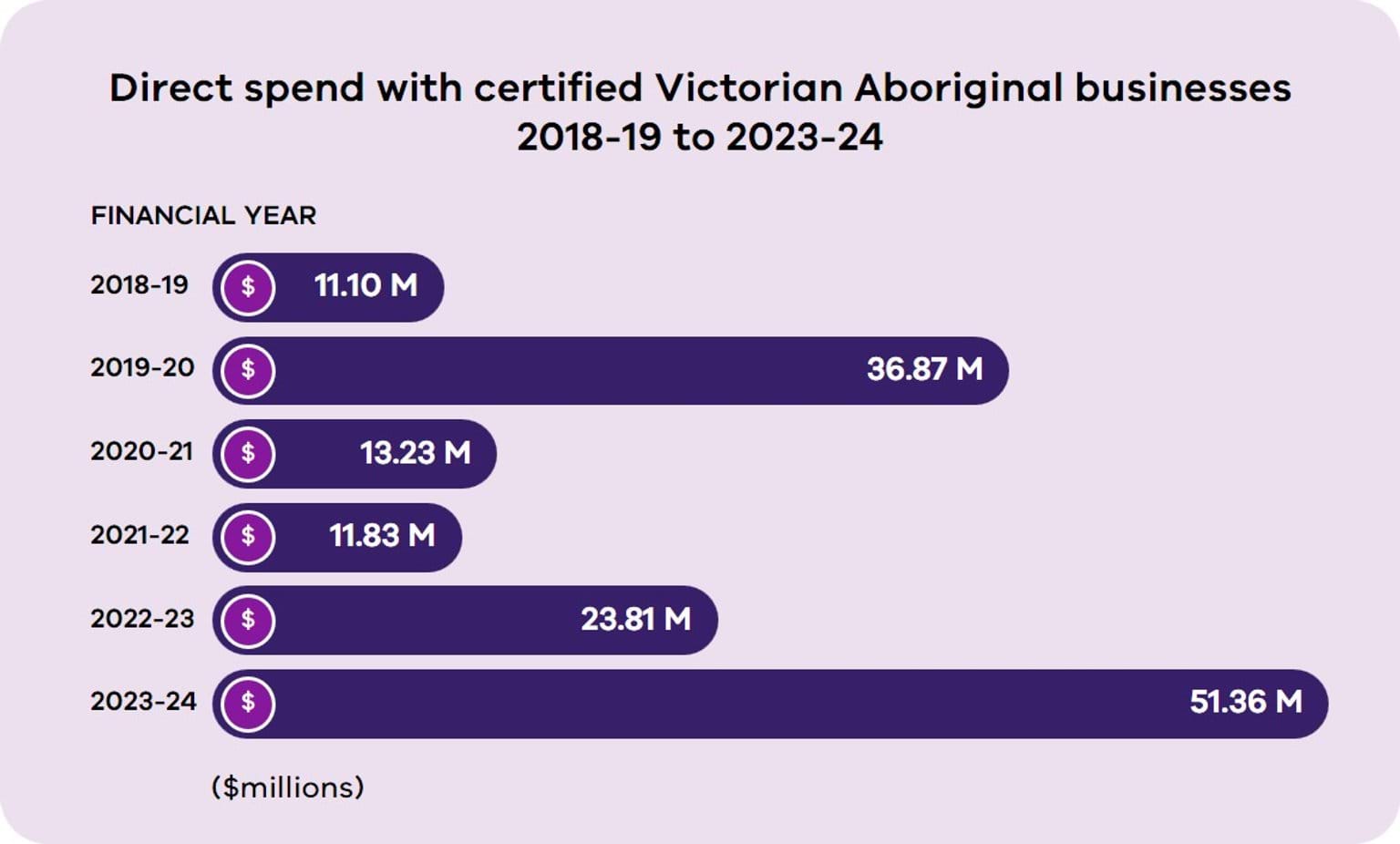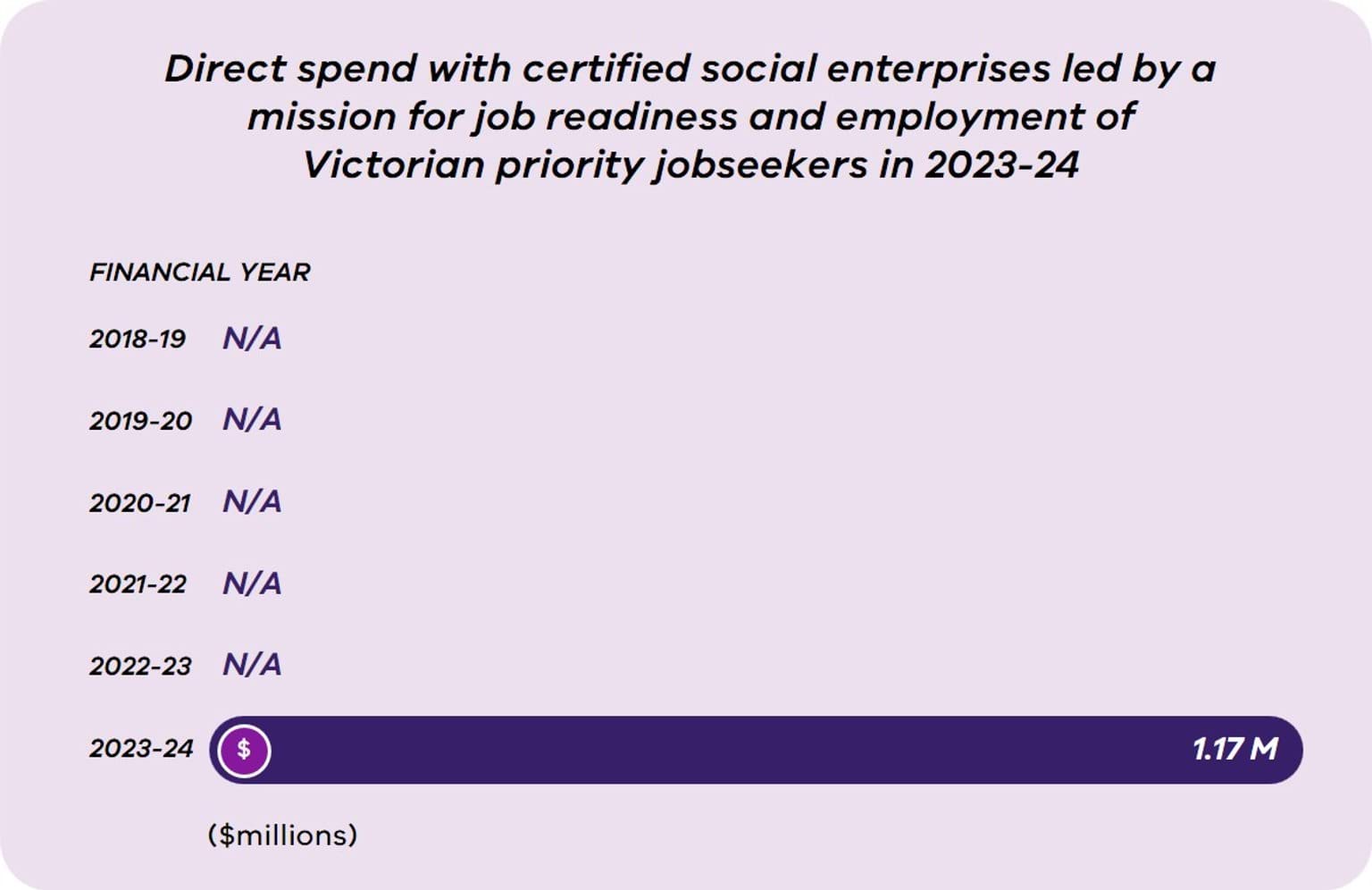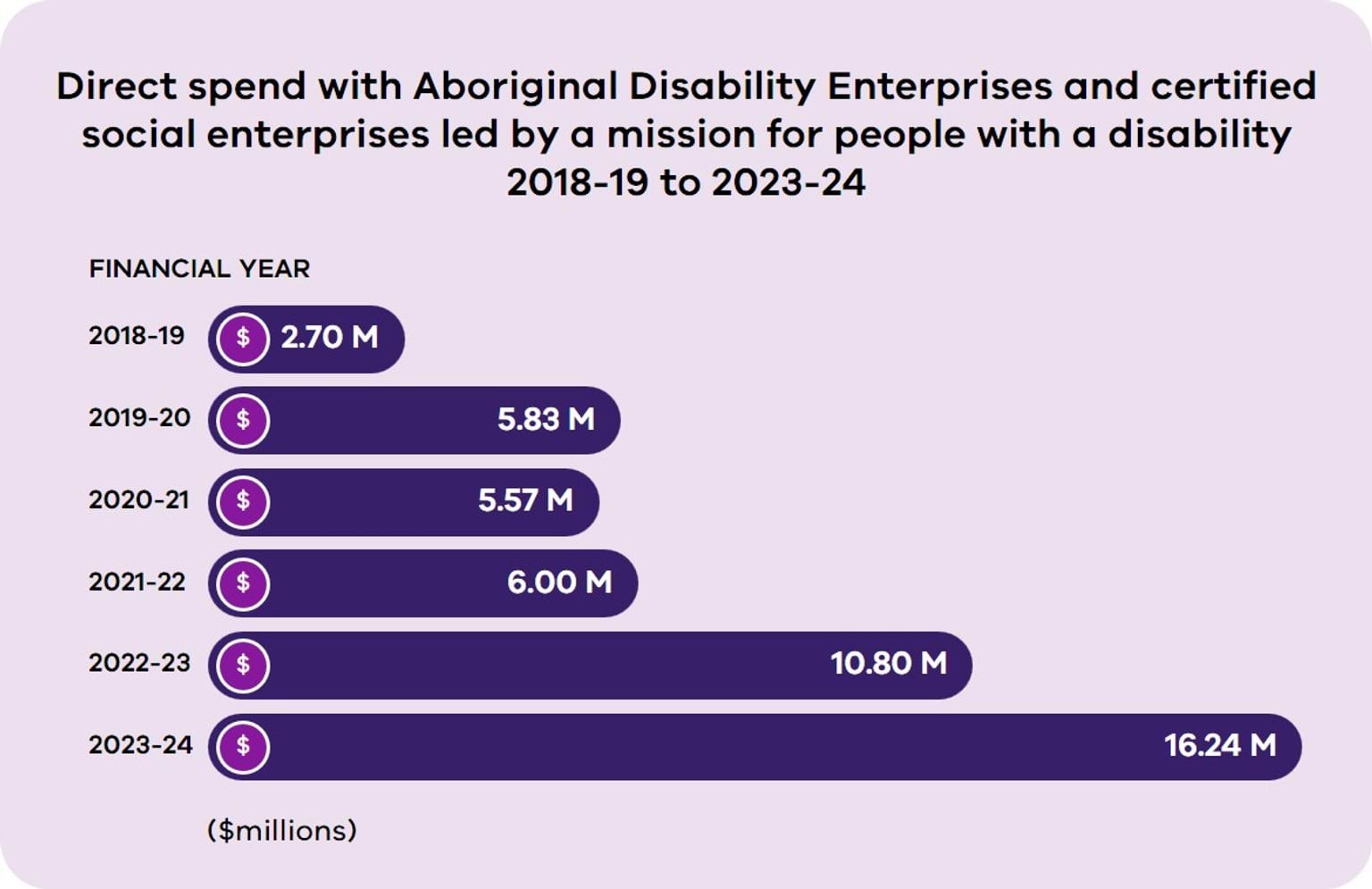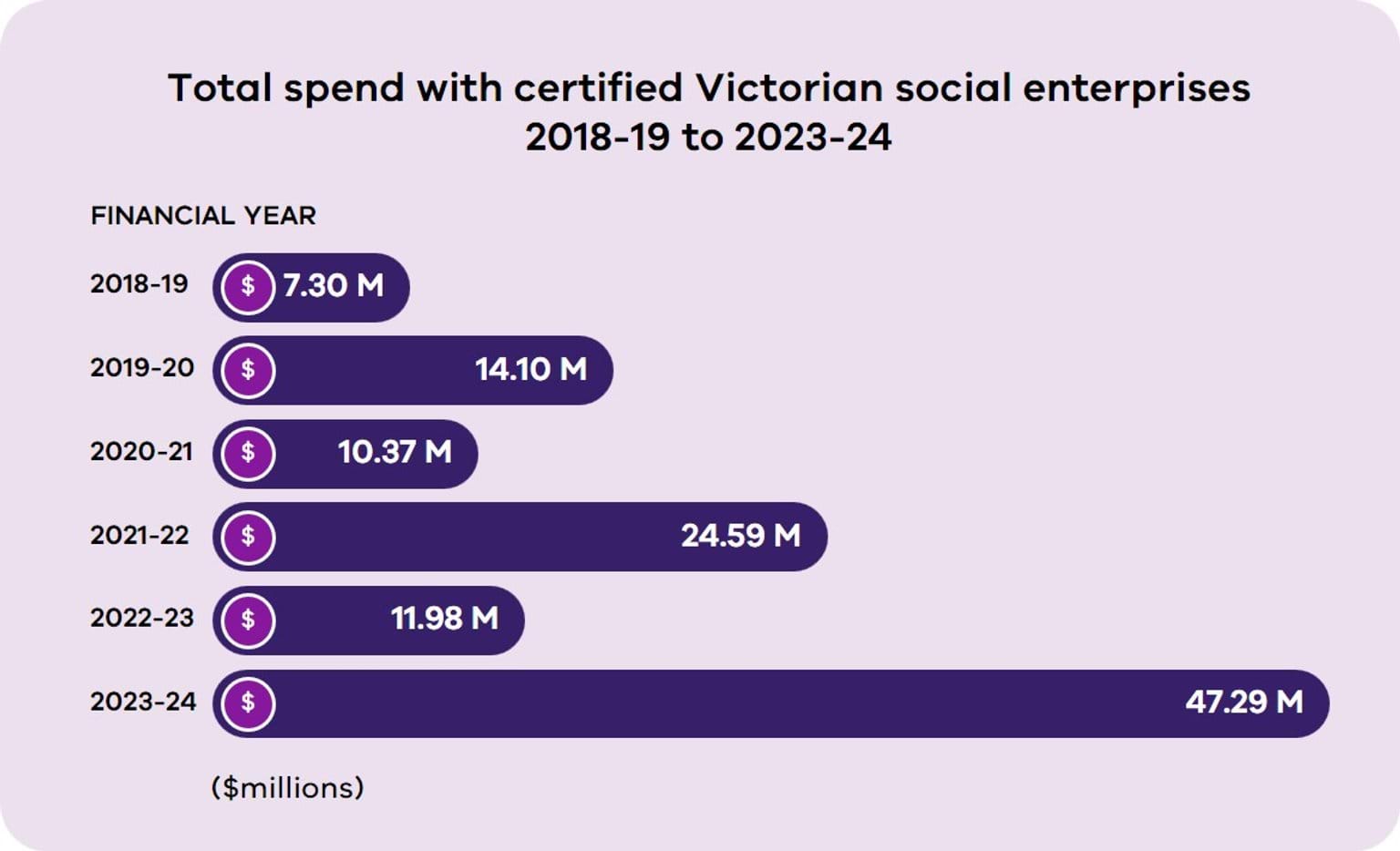- Published by:
- Department of Government Services
- Date:
- 1 June 2025
The report provides a snapshot of Social Procurement Framework achievements over time and stories that showcase the impacts of the Framework on Victorians and social benefit suppliers.
The report also demonstrates the difference each government procurement can make to the lives of Victorians and Victorian communities.
It also sets a baseline to measure social procurement achievements in the future.
Acknowledgments
Victoria’s Social Procurement Framework was developed by the Department of Government Services. A range of departments and agencies across government contribute to the Social Procurement Framework annual report each year.
From 1 January 2023, all functions relating to the Social Procurement Framework were coordinated by the Department of Government Services. Natalie Hutchins is the responsible Minister for the framework in her capacity as the Minister for Government Services.
Language statement
We recognise the diversity of Aboriginal people living in Victoria. We use the term ‘Aboriginal Victorians’ to include Victorian Traditional Owners, clans, family groups, and all other Aboriginal and Torres Strait Islander descendants living in Victoria. The term ‘Aboriginal community’ includes Traditional Owners, business owners and other community representatives.
‘Department’, ‘we’ or ‘our’ are referring to the Department of Government Services/Victorian government.
Disclaimer
This publication may be of assistance to you, but the State of Victoria and its employees do not guarantee that the publication is without flaw of any kind or is wholly appropriate for your particular purposes and therefore disclaims all liability for any error, loss or other consequence which may arise from you relying on any information in this publication.
Accessibility
We have provided as much of this annual report in HTML as practicable.
If you would like to receive this publication in an accessible format, please telephone 03 7005 9138 or email: buyingforvictoria@dtf.vic.gov.au.
Message from Minister for Government Services Natalie Hutchins
Discover the key milestones, performance highlights, and impact stories that defined our year in the 2023-24 annual report.
Message from Minister for Government Services Natalie Hutchins
Since 2018, the Victorian Government has leveraged its buying power through innovative social procurement policy to amplify opportunities and drive sustainable growth that all Victorians can benefit from.
The Social Procurement Framework (the Framework) streamlines and embeds social procurement within ordinary government processes, ensuring that value-for-money is the driving force behind all Victorian Government procurement decisions. This delivers benefits to the Victorian community above and beyond the value of the goods, services or construction being procured.
During the 2023-24 financial year, the Victorian Government’s ten departments and largest agencies directly spent $51.36 million with 113 certified Victorian Aboriginal businesses, and $47.29 million with 96 certified Victorian social enterprises. This brings the government’s direct spend, since 2018, to $148.2 million and $115.6 million respectively with these enterprises.
On 1 July 2023, the Framework’s Opportunities for disadvantaged Victorians objective was replaced with the Opportunities for Victorian priority jobseekers objective. Following this, the government started tracking direct spend with certified social enterprises led by a mission for job readiness and employment of Victorian priority jobseekers.
By creating sustainable pathways to employment and improving economic participations of Victorian Aboriginal people, women, those living with a disability and those in regional Victoria, the Framework ensures that the Victorian Government continues to create a future where opportunities are shared by everyone. I am proud to share the results from this critical policy for the 2023-24 financial year.
About the Social Procurement Framework in 2023-24
Review the key highlights that shaped our year.
Victorian Government procurement is one of the largest drivers of the Victorian economy. Value for money is the key consideration underpinning all Victorian Government procurement decisions. The Social Procurement Framework (the Framework) ensures value-for-money considerations are not solely focused on price but encompass opportunities to deliver social and sustainable outcomes that benefit the entire Victorian community. In this way, the Framework helps government create economic benefit and jobs for all Victorians.
Social procurement objectives and summary of priorities
The Framework is used by more than 260 government departments and agencies1 to identify their social and sustainable procurement goals. These goals are detailed in the agency’s Social Procurement Strategy or Plan and will often align with other government strategies, priorities and initiatives. Departments and agencies report on progress towards their social and sustainable procurement goals in their respective annual reports and contribute to the whole-of-government report.
[1] This refers to government departments and agencies subject to the Standing Directions 2018 under the Financial Management 1994 as at January 2023.
Highlight achievements
Achievements since the launch of the Framework in 2018
Since 2018, Victorian Government departments and major agencies2 have continued to directly invest in Victoria’s social benefit suppliers spending a total of:
- $148.2 million with certified Victorian Aboriginal businesses3
- $115.6 million with certified Victorian social enterprises4
Achievements in this reporting period (1 July 2023–30 June 2024)
Victorian Government departments and major agencies directly spent:
- $51.36 million with 113 certified Victorian Aboriginal businesses
- $47.29 million with 96 certified Victorian social enterprises
- of which, $1.17 million was spent with 7 certified Victorian social enterprises led by a mission for job readiness and employment of Victorian priority jobseekers
- $16.24 million with 39 Australian Disability Enterprises or social enterprises led by a mission for people with disability
[2]Departments and agencies included are Department of Energy, Environment and Climate Action (DEECA), Department of Education (DE), Department of Families, Fairness and Housing (DFFH), Department of Health (DH), Department of Justice and Community Safety (DJCS), Department of Jobs, Skills, Industry and Regions (DJSIR), Department of Transport and Planning (DTP), Department of Premier and Cabinet (DPC), Department of Treasury and Finance (DTF), Department of Government Services (DGS), Victoria Police, Major Transport Infrastructure Authority (MTIA) and CenITex.
[3]Certified Aboriginal businesses refer to Victorian Aboriginal businesses that are certified by Kinaway Chamber of Commerce (Kinaway) or Supply Nation. For the 2023-24 reporting period, only spend with Victorian Aboriginal businesses certified by Kinaway or Supply Nation has been reported to ensure alignment with the Framework definitions which does not include spend with Traditional Owner Corporations and/or Aboriginal Community Controlled Organisations that are not certified by Kinaway or Supply Nation.
[4] Certified Victorian Social Enterprises refer to organisations that are certified by Social Traders and operate and have business premises in Victoria. There was a policy change to discontinue use of the Map for Impact database as a source to identify and verify social enterprises. The Map for Impact will no longer be included under the operational definition of ‘social enterprise’ for Framework purposes.
Opportunities for Victorian Aboriginal people
Find out how the Government supports Victorian Aboriginal people to participate in government procurement.
The Opportunities for Victorian Aboriginal people objective focuses on generating employment and economic prosperity by purchasing from Victorian Aboriginal businesses and purchasing from suppliers employing Victorian Aboriginal people.
Direct spend with certified Aboriginal businesses varies year-on-year, reflecting the varying needs of government over time.
Opportunities for Victorian priority jobseekers
Learn about how the Government is helping Victorians experiencing disadvantage with meaningful employment opportunities.
On 1 July 2023, the Opportunities for disadvantaged Victorians objective was replaced with the Opportunities for Victorian priority jobseekers objective.
The revised objective supports improved implementation of the SPF and Victorian Government priorities through alignment with the Jobs Victoria priority jobseekers definition and Jobs Victoria services. This will also be more inclusive of participants/clients of services across government.
A Victorian priority jobseeker must be one of the following:
- long-term unemployed (unemployed for 12 months or more)
- at risk of long-term unemployment:
- working less than 12 hours per week in casual, temporary, or intermittent work
- experiencing employment barriers (e.g. not completing secondary education, low English language proficiency)
A young person aged 15 to 24, is also a considered a priority jobseeker if they are:
- unemployed
- working less than 12 hours in casual, temporary, or intermittent work
- not in full time study
*Note that this objective was not measured prior to 2023-24.
Opportunities for Victorians with disability
Creating jobs for people with disability through purchasing from Australian Disability Enterprises and relevant social enterprises.
The Opportunities for Victorians with disability objective aims to help ensure all Victorians can participate fully in dignified work. This objective aims to create jobs for those with disability through purchasing from Australian Disability Enterprises and social enterprises with a mission to support people with disability, as well as purchasing from Victorian Government suppliers directly employing people with disability5.
[5] In 2018-19, data for this cohort was collected between January and June 2019 only. Note that the direct spend with Australian Disability Enterprises and certified social enterprises led by a mission for people with a disability was underreported in FY2022-23. The figure has been amended in this report to represent actual spend of $10.08 million.
Sustainable Victorian social enterprise and Aboriginal business sectors
Victorian social enterprises and Aboriginal businesses play an important role in driving employment participation and inclusive economic growth.
The Sustainable Victorian social enterprise and Aboriginal business sectors objective directs spending toward social enterprises and Aboriginal businesses, empowering them to succeed and supporting vibrant and inclusive economic growth6.
For Direct Spend with verified Aboriginal Businesses between 2018–19 and 2023–24, see: Opportunities for Aboriginal Victorians.
[6] In 2018-19, data for this cohort was collected between January and June 2019 only.
How suppliers work with the Framework
Understand the role suppliers play in social procurement.
There are 2 types of government suppliers: social benefit suppliers and mainstream suppliers.
A social benefit supplier operates and has business premises in Victoria and meets one or more of the following criteria:
- is a social enterprise certified by Social Traders
- is an Australian Disability Enterprise providing ‘supported employment services’ as defined in s. 7 of the Disability Services Act 1986 (Cth)
- is a Victorian Aboriginal business, certified by Supply Nation or Kinaway
To count an engagement in its social procurement activity reports, a department or agency must ensure the social benefit supplier is certified.
A mainstream supplier is any supplier that is not a social benefit supplier.
Direct and indirect social procurement
The Victorian Government delivers social and sustainable outcomes through both direct and indirect social procurement. Government buyers should consider opportunities to deliver social and sustainable outcomes as part of every procurement activity.
For direct procurement, departments or agencies can undertake a Victorian Government procurement process or use an established SPC to purchase goods, services or construction from a certified social benefit supplier.
When it comes to indirect procurement, departments or agencies can purchase goods, services or construction from a mainstream supplier using invitations to supply and clauses in contracts to deliver social and sustainable outcomes. This can include subcontracting social benefit suppliers in supply chains.
What suppliers need to demonstrate
When making purchasing decisions under the Framework, government buyers must apply the same due diligence for social benefit suppliers as they would for mainstream suppliers. They should consider whether certified social benefit suppliers:
- are suitably qualified
- demonstrate experience and have a proven track record
- have the capacity and scale to deliver the requisite work
- comply with mandatory government agency contract terms
- comply with all relevant industry standards, regulations and legislation
- are competitively priced
- have business practices that align with the Framework, such as a corporate social responsibility policy, gender or disability action plans or engagement with social benefit suppliers.
Social procurement benefits suppliers
The Framework integrates positive social and environmental outcomes with core business. The ability to demonstrate these outcomes makes suppliers more competitive when bidding for government work.
It also helps to foster workplace diversity, capability and productivity and contributes to innovative solutions for complex social, economic and environmental problems.
Find out more
Discover more about social procurement.
More information for government buyers and suppliers about the Social Procurement Framework can be found on the Buying for Victoria website.
Recycled First is a Victorian Government policy that requires bidders on government road and rail projects to demonstrate how they will optimise the use of sustainable products.
Sustainability Victoria’s Buy Recycled directory helps you find products with recycled content.
Business Victoria also has information on selling to government.







